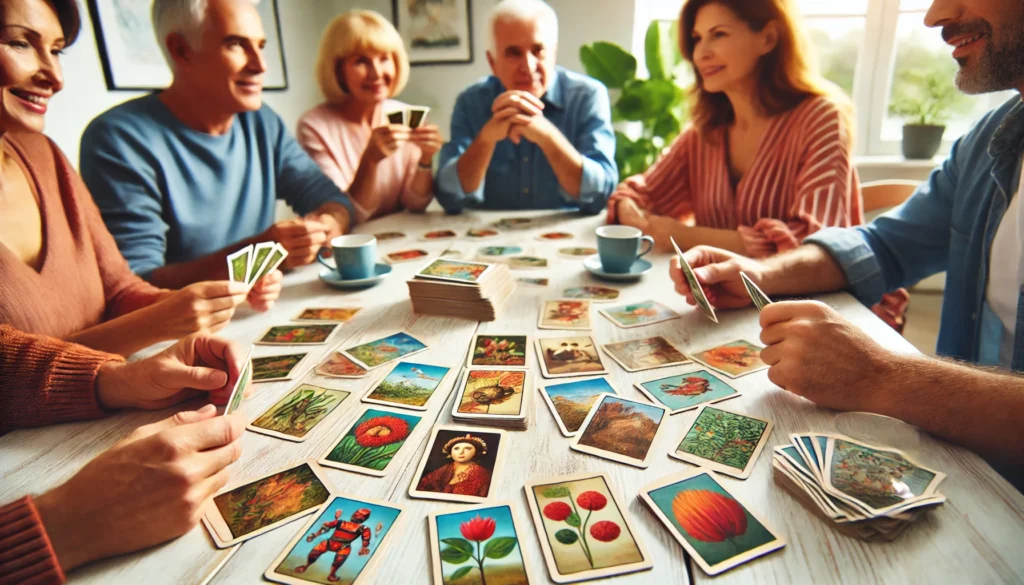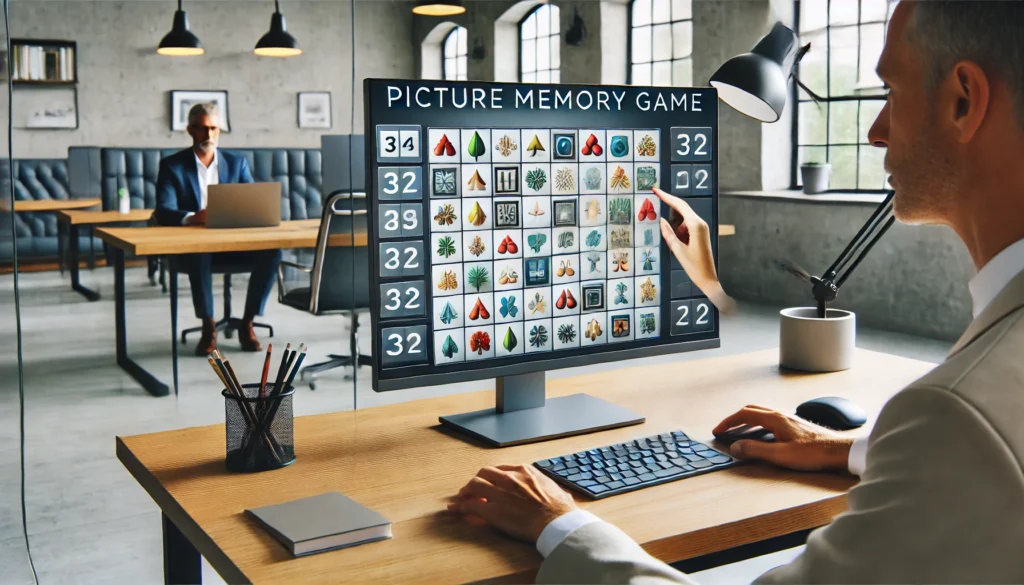In a world constantly abuzz with information, enhancing one’s memory is more crucial than ever. Picture memory games, often underestimated in their simplicity, offer profound benefits for mental acuity and cognitive resilience. These games not only provide an enjoyable diversion but also serve as a rigorous exercise for the brain, enhancing memory retention and recall.
You may also like: Boost Your Mind: Top Brain Games
The Science Behind Memory Games
Memory games, particularly those involving pictures, harness the brain’s innate ability to recognize and recall visual information. The human brain is hardwired to process and store images more efficiently than text, making picture memory games an ideal tool for cognitive enhancement.
The Brain’s Visual Processing Power
The human brain is naturally inclined to process visual stimuli more effectively than verbal or numerical data. This is due to the evolution of the brain’s visual cortex, which is highly developed to interpret complex visual cues. Picture memory games take advantage of this by presenting information in a form that the brain can rapidly and accurately process.
Neural Pathways and Memory Formation
Engaging in picture memory games stimulates the formation of neural pathways, which are essential for memory retention. These pathways are like highways for information in the brain, allowing for quick and efficient retrieval of stored data. The more these pathways are exercised, the stronger they become, enhancing overall memory capacity.
The Role of the Hippocampus
The hippocampus plays a crucial role in the formation and retrieval of memories. When engaging in memory games, this part of the brain is activated, leading to improved functionality over time. Regular stimulation through these games can enhance the hippocampus’s ability to store and recall information, contributing to better memory performance.
Cognitive Benefits
Picture memory games offer a range of cognitive benefits that extend beyond mere memory enhancement. These benefits contribute to overall mental agility and cognitive resilience, making these games a valuable tool for cognitive development.
Enhanced Memory Retention
By challenging the brain to recall images and their locations, these games significantly improve both short-term and long-term memory. Players are required to remember visual cues and their positions, strengthening the brain’s ability to store and retrieve information accurately.
Increased Attention Span
Successful gameplay requires sustained focus, which helps players develop a heightened ability to concentrate. This increased attention span can translate into improved performance in other areas that require prolonged focus, such as work or study.
Improved Visual Recognition Skills
As players engage with diverse images, their ability to recognize patterns and details is enhanced. This improvement in visual recognition skills can aid in various real-world tasks, from reading comprehension to visual arts, where keen observation is essential.
Historical Context of Memory Games
Memory games have a rich history, tracing back to ancient civilizations that recognized the importance of mental agility. The concept of memory games has evolved over centuries, from simple card-matching activities to sophisticated digital applications.
Ancient Origins and Early Games
The earliest forms of memory games can be traced back to ancient cultures, such as the Romans, who engaged in games of “Concentration” using rudimentary playing cards. These early games were not only a source of entertainment but also a means to sharpen mental faculties and enhance memory skills.
The Influence of the Printing Press
The invention of the printing press in the 15th century facilitated the widespread distribution of playing cards. This technological advancement popularized card games across Europe, paving the way for the development of more complex memory games that challenged cognitive abilities.
Educational Integration in the 20th Century
By the 20th century, memory games had become a staple in educational settings. Educators recognized their potential to enhance cognitive development in children, incorporating them into curricula to promote critical thinking and problem-solving skills alongside memory improvement.

Modern Applications of Picture Memory Games
In today’s digital age, memory games have transitioned from physical cards to dynamic apps and online platforms, making them accessible to a global audience. These modern adaptations offer a plethora of features designed to challenge and entertain users.
Digital Transformation and Accessibility
The advent of technology has revolutionized the way we engage with memory games. Apps like “Lumosity” and “Peak” offer picture memory games tailored to adult users, incorporating advanced algorithms that adapt to individual skill levels. This digital transformation has made cognitive training more accessible and engaging for users worldwide.
Matching Games for Adults App
These applications provide a convenient way for adults to engage with memory-enhancing games on the go. With a variety of challenges that cater to different cognitive skills, users can select games that align with their personal goals, ensuring a customized cognitive training experience.
Memory Card Games for Adults
Digital platforms offer a wide selection of card-matching games that range from traditional formats to innovative designs. These games are specifically designed to stimulate memory and cognitive function, offering users a comprehensive approach to cognitive enhancement.
Everyday Matching Games
For those seeking a more casual approach, everyday matching games provide a simple yet effective way to incorporate cognitive training into daily routines. These games, often found in the form of mobile apps or online platforms, offer short bursts of mental exercise ideal for busy schedules.
Casual Gaming for Cognitive Health
Everyday matching games are an excellent option for those looking to maintain cognitive health without a significant time commitment. These games can be played during short breaks, providing a quick mental workout that contributes to cognitive resilience over time.
Integration into Daily Routines
Incorporating these games into daily routines is simple and requires minimal effort. Whether played during a commute or a coffee break, these games offer a convenient way to keep the brain engaged and active, promoting long-term cognitive health.
Variety and Engagement
The diverse range of everyday matching games ensures that players remain engaged and motivated. With new challenges and levels to explore, users can enjoy a dynamic cognitive training experience that keeps their interest piqued and their minds sharp.
The Future of Memory Enhancement
As research into cognitive science and neuroplasticity continues to advance, the potential applications for memory games in enhancing mental acuity are vast. Future developments may include the integration of artificial intelligence to create personalized cognitive training programs.
AI and Personalized Training
Emerging technologies promise to revolutionize the landscape of memory games by offering personalized experiences tailored to individual cognitive profiles. AI-driven applications could analyze user performance to deliver customized challenges that target specific areas of memory and cognitive function, maximizing the benefits of cognitive training.
The Role of Nootropics
In parallel with the evolution of memory games, the field of nootropics—substances that enhance cognitive function—has gained significant attention. Combining nootropic supplements with regular engagement in memory games may offer synergistic benefits for brain health and mental performance, leading to enhanced cognitive outcomes.
Virtual Reality and Immersive Experiences
The integration of virtual reality into memory games could offer immersive experiences that further enhance cognitive training. By creating realistic environments that challenge memory and problem-solving skills, virtual reality could provide a cutting-edge approach to cognitive enhancement, making training more engaging and effective.

Practical Tips for Engaging with Memory Games
Engaging with memory games effectively requires consistency, challenge, and a holistic approach that combines cognitive and physical activities for optimal brain health.
Consistency is Key
Regular engagement with memory games is crucial for reaping cognitive benefits. Aim to incorporate these games into your routine several times a week, ensuring that your brain receives the consistent exercise it needs to maintain and improve memory function.
Challenge Yourself
Gradually increase the difficulty level of the games you play to continuously challenge your brain and promote cognitive growth. As you become more proficient, seek out more complex games that test different aspects of memory and cognitive ability.
Combine with Physical Activity
Physical exercise has been shown to complement cognitive training, enhancing overall brain health. Incorporating physical activity into your routine alongside memory games can lead to improved cognitive outcomes, as exercise increases blood flow to the brain and supports neuroplasticity.

Conclusion
Picture memory games offer a compelling blend of entertainment and cognitive enhancement, making them an ideal tool for anyone seeking to bolster their mental faculties. Whether you’re a health and wellness coach, science journalist, or biohacker, integrating these games into your routine can provide a valuable boost to your cognitive health. As you engage with these games, remember that the journey to enhanced memory is a marathon, not a sprint—steady, consistent practice will yield the best results over time.
Further Reading:
Important Note: The information contained in this article is for general informational purposes only, and should not be construed as health or medical advice, nor is it intended to diagnose, prevent, treat, or cure any disease or health condition. Before embarking on any diet, fitness regimen, or program of nutritional supplementation, it is advisable to consult your healthcare professional in order to determine its safety and probable efficacy in terms of your individual state of health.
Regarding Nutritional Supplements Or Other Non-Prescription Health Products: If any nutritional supplements or other non-prescription health products are mentioned in the foregoing article, any claims or statements made about them have not been evaluated by the U.S. Food and Drug Administration, and such nutritional supplements or other health products are not intended to diagnose, treat, cure, or prevent any disease.


